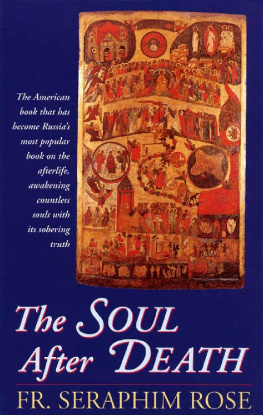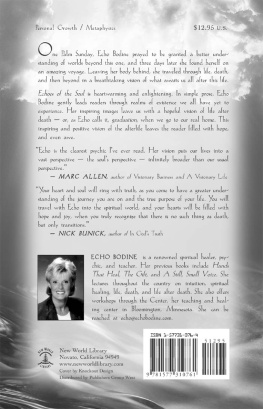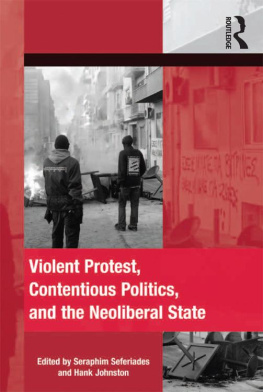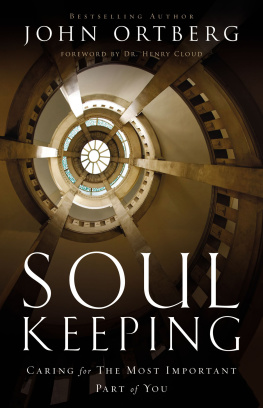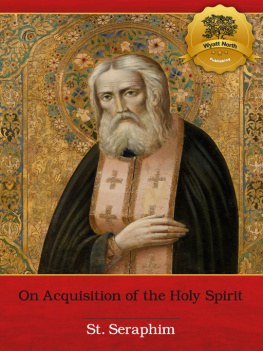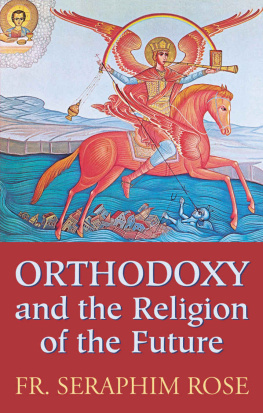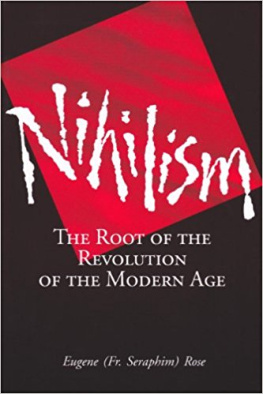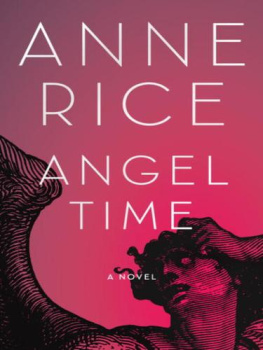Fr. Seraphim Rose - The Soul After Death
Here you can read online Fr. Seraphim Rose - The Soul After Death full text of the book (entire story) in english for free. Download pdf and epub, get meaning, cover and reviews about this ebook. year: 2014, publisher: St. Herman Press, genre: Religion. Description of the work, (preface) as well as reviews are available. Best literature library LitArk.com created for fans of good reading and offers a wide selection of genres:
Romance novel
Science fiction
Adventure
Detective
Science
History
Home and family
Prose
Art
Politics
Computer
Non-fiction
Religion
Business
Children
Humor
Choose a favorite category and find really read worthwhile books. Enjoy immersion in the world of imagination, feel the emotions of the characters or learn something new for yourself, make an fascinating discovery.
- Book:The Soul After Death
- Author:
- Publisher:St. Herman Press
- Genre:
- Year:2014
- Rating:5 / 5
- Favourites:Add to favourites
- Your mark:
- 100
- 1
- 2
- 3
- 4
- 5
The Soul After Death: summary, description and annotation
We offer to read an annotation, description, summary or preface (depends on what the author of the book "The Soul After Death" wrote himself). If you haven't found the necessary information about the book — write in the comments, we will try to find it.
The Soul After Death — read online for free the complete book (whole text) full work
Below is the text of the book, divided by pages. System saving the place of the last page read, allows you to conveniently read the book "The Soul After Death" online for free, without having to search again every time where you left off. Put a bookmark, and you can go to the page where you finished reading at any time.
Font size:
Interval:
Bookmark:

The twenty stations of the aerial toll houses.
Detail of a 16th-century Novgorod icon, Hann Collection, Pittsburgh, Pennsylvania.

HIEROMONK SERAPHIM ROSE
19341982
THE SOUL
AFTER DEATH
C ONTEMPORARY A FTER -D EATH E XPERIENCES
IN THE L IGHT OF THE O RTHODOX
T EACHING ON THE A FTERLIFE
BY FR. SERAPHIM ROSE

ST. HERMAN OF ALASKA BROTHERHOOD
2009
Copyright 1980, 2009 by the
St. Herman of Alaska Brotherhood
P. O. Box 70
Platina, California 96076
www.sainthermanmonastery.com
First Printing, 1980
Second Printing, Second Edition, 1982
Third Printing, 1987
Fourth Printing, Third Edition, 1993
Fifth Printing, 1995
Sixth Printing, 1998
Seventh Printing, Fourth Edition, 2004
Eighth Printing, Fourth Edition, 2009
First Digital Edition, 2014
Printed in the United States of America
Front cover: Russian icon of the Last Judgment. Courtesy of A. Dean McKenzie, John F. Waggaman, and the Timken Art Gallery.
Back cover: Fr. Seraphim Rose in front of the Holy Doors at the St. Herman of Alaska Monastery, Platina, California, 1977.
Publishers Cataloging-in-Publication
Rose, Hieromonk Seraphim, 19341982.
The soul after death: contemporary after-death experiences in the light of the Orthodox teaching on the afterlife / by Fr. Seraphim Rose. 4th ed.
p. cm.
Includes bibliographical references and index.
ISBN: 0-938635-14-X
1. Future life Orthodox Eastern Church. 2. Orthodox Eastern Church Doctrines. 3. Near-death experiences Religious aspects Orthodox Eastern Church. I. Title
BX323.R67 2004
| 236/.2 dc22 | 93-085175 |
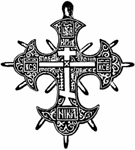
THERE WAS a certain rich man, which was clothed in purple and fine linen, and fared sumptuously every day; and there was a certain beggar named Lazarus, which was laid at his gate, full of sores, and desiring to be fed with the crumbs which fell from the rich mans table; moreover, the dogs came and licked his sores. And it came to pass, that the beggar died, and was carried by the angels into Abrahams bosom; the rich man also died, and was buried, and in hell he lifted up his eyes, being in torments, and seeth Abraham afar off, and Lazarus in his bosom. And he cried and said, Father Abraham, have mercy on me, and send Lazarus, that he may dip the tip of his finger in water, and cool my tongue; for I am tormented in this flame. But Abraham said, Son, remember that thou in thy lifetime receivedst thy good things, and likewise Lazarus evil things; but now he is comforted, and thou art tormented. And beside all this, between us and you there is a great gulf fixed, so that they which would pass from hence to you cannot; neither can they pass to us, that would come from thence. Then he said, I pray thee therefore, father, that thou wouldest send him to my fathers house: for I have five brethren, that he may testify unto them, lest they also come into this place of torment. Abraham saith unto him, They have Moses and the prophets; let them hear them. And he said, Nay, father Abraham: but if one went unto them from the dead, they will repent. And he said unto him, If they hear not Moses and the prophets, neither will they be persuaded, though one rose from the dead.
Luke 16:1931

An angel carrying the soul of St. Artemius of Verkola to heaven.
Detail of a 17th-century icon from Moscow/Yaroslavl, depicting St. Artemius with scenes from his life.
Contents
Preface
T HE AIM of the present book is two-fold: first, to give an explanation, in terms of the Orthodox Christian doctrine of life after death, of the present-day after-death experiences that have caused such interest in some religious and scientific circles; and second, to present the basic sources and texts which contain the Orthodox teaching on life after death. If the Orthodox teaching is so little understood today, it is largely because these texts have been so neglected and have become so unfashionable in our enlightened times; and our attempt has been to make these texts more understandable and accessible to present-day readers. Needless to say, they constitute a reading material infinitely more profound and more profitable than the popular after-death books of our day, which, even when they are not merely sensational, simply cannot go much below the spectacular surface of todays experiences for want of a coherent and true teaching on the whole subject of life after death.
The Orthodox teaching presented in this book will doubtless be criticized by some as being too simple or even naive for a 20th-century man to believe. It should therefore be emphasized that this teaching is not that of a few isolated or untypical teachers in the Orthodox Church, but is the teaching which the Orthodox Church of Christ has handed down from her very beginning, which is expressed in countless Patristic writings and Lives of Saints and in the Divine services of the Orthodox Church, and which has been taught uninterruptedly in the Church even down to our own day. The simplicity of this teaching is the simplicity of truth itself, which whether it is expressed in this or in other teachings of the Church comes as a refreshing fountain of clarity in the midst of the dark confusion caused in modern minds by the various errors and empty speculations of recent centuries. Each chapter of this book attempts to point to the Patristic and hagiographical sources which contain this teaching.
The chief inspiration for the writing of this book has been a 19th-century Russian Orthodox Father, Bishop Ignatius Brianchaninov, who was perhaps the first great Orthodox theologian to face squarely the very problem which has become so acute in our own days: how to preserve the authentic Christian tradition and teaching in a world that has become entirely foreign to Orthodoxy and strives either to overthrow and dismiss it or else reinterpret it so that it can be made compatible with a worldly way of life and thinking. Acutely aware of the Roman Catholic and other Western influences which were striving to modernize Orthodoxy even in his days, Bishop Ignatius prepared for the defense of Orthodoxy both by delving deeply into the authentic Orthodox sources (whose teaching he absorbed in some of the best Orthodox monastic centers of his time) and by familiarizing himself also with the scientific and literary culture of his century (he attended an engineering school, not a theological seminary). Armed thus with a knowledge both of Orthodox theology and of secular knowledge, he devoted his life to the defense of authentic Orthodoxy and to an exposure of the modern deviation from it. It is no exaggeration to say that no other Orthodox country in the 19th century possessed such a defender of Orthodoxy against the temptations and errors of modern times; his only rival, perhaps, was his fellow-countryman, Bishop Theophan the Recluse, who did much the same thing on a less sophisticated level.
One volume of Bishop Ignatius Collected Works
Font size:
Interval:
Bookmark:
Similar books «The Soul After Death»
Look at similar books to The Soul After Death. We have selected literature similar in name and meaning in the hope of providing readers with more options to find new, interesting, not yet read works.
Discussion, reviews of the book The Soul After Death and just readers' own opinions. Leave your comments, write what you think about the work, its meaning or the main characters. Specify what exactly you liked and what you didn't like, and why you think so.

